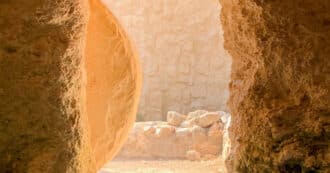The Rev. Dr. Leah D. Schade
Thomas’s spiritual crisis of doubt and disbelief came from an honest place of trauma and grief. Today, suffering grief in our climate-changed world can lead to an eco-spiritual crisis. Touching the wounds of our planet is necessary for compassion and healing.
Here are ideas for reading and preaching John 20:19-31 on the Second Sunday of Easter. This year, the story of Thomas disbelieving the news that Jesus had risen occurs on April 16th, the Sunday preceding Earth Day. It is an ideal Sunday to connect our faith with God’s Creation. This is part of the EcoPreacher 1-2-3 series to equip preachers and congregations for engaging the Bible through an ecological lens.
Eco-Exegesis
Eco-exegesis is a method of interpreting the biblical text through a green lens using the principles of ecological theology.
John 20:25 — Thomas said: “Unless I see the mark of the nails in his hands, and put my finger in the mark of the nails and my hand in his side, I will not believe.”
Thomas had not witnessed Jesus’s resurrection appearance as his colleagues had. For whatever reason, he was not present to see the risen Christ. So, he was still stuck in a spiritual crisis borne of trauma and grief. What he did witness was the state-sanctioned murder of his teacher by political leaders driven by arrogance, fear, and an unquenchable thirst for power. It’s no wonder he expressed doubt and disbelief; he was reeling from trauma and grief.
When Jesus does finally appear to Thomas, he invites him to touch his wounds and encourages him to believe. Believe that the end of the story is not yet written. Believe that a better future is possible. And believe that life can arise even out of the most horrific death. It is a moment of deep compassion, connection, and healing for Thomas.
When we touch the wounds of our planet, we might find ourselves experiencing an eco-spiritual crisis. We witness the undeniable degradation, pollution, systemic unravelling, and death that is happening to plant and animal species, entire ecosystems, and our human communities. We feel powerless against the seemingly unstoppable destructive reign of leaders and systems driven by arrogance, fear, and an unquenchable thirst for power and wealth. It is no wonder that we fall into despair that blinds us to hope.
This is why preachers need to lift up stories of environmental woundedness being transformed by a vision for wholeness, healing, and hope. We need to hear about inspiring examples of ecological justice that remind us that the end of the story is not yet written. That a better future is possible. That life can arise even out of the most horrific death.
The ecoAmerica Climate Leadership Awards is just such a collection of these stories. They highlight ten different examples of organizations that are transforming environmental woundedness into restoration and justice. The organizations doing this amazing work are:
- Amazon Employees for Climate Justice
- Chesapeake Climate Action Network: Electrify MoCo Campaign
- Climate Generation: Improving Nationwide Climate Change Education, Our Teach Climate Network
- Cooperation Jackson: Jackson Just Transition Plan
- Hawaii Green Growth UN Local 2030 Hub
- Migrant Clinicians Network: Meeting the Needs of Vulnerable Populations Impacted by Climate Change
- Mothers Out Front: Organizing For a Livable Climate for All
- The Wild Center: Youth Climate Program
- Unitarian Universalist Association: Climate Justice programming
- Zumwalt Acres: A Regenerative Agriculture Community
Here is the link to learn more: https://ecoamerica.org/american-climate-leadership-awards-2023/.
A sermon connecting Thomas’s spiritual crisis with the eco-spiritual crisis of our time can echo the compassion, connection, and healing in Jesus’s words. “Peace be with you. Put your finger here and see my hands. Reach out your hand and put it in my side. Do not doubt but believe” (John 20:26b-27).
1. Eco-Idea
The Eco-Idea is one succinct statement that tells us who God is and/or what God does in relation to Creation and how we should respond as people of faith.
Just as Jesus invited Thomas to touch his wounds and believe in new life, so does the risen Christ come to us as we are touching the wounds of our planet in order to bring wholeness, healing, and hope.
2. Eco-Questions
Eco-Questions are what we can ask to help a congregation draw out the implications of the Eco-Exegesis and Eco-Idea.
- What environmental pain causes you to experience an eco-spiritual crisis or grief? Is it the loss of natural areas you once loved? The extinction of species? The climate-charged weather catastrophes that are destroying communities? How does your mind and body process this grief?
- During this Earth Week, what are ways that you can support the people who are on the front lines of “touching the wounds” of our planet? Can you support organizations that are protecting natural lands? Can you join a local environmental group that is fighting against destructive industries? What are the wounds that are calling for your attention?
3. Eco-Actions
Eco-Actions are ways that a congregation might respond to the Eco-Idea and Eco-Questions. One of these possibilities may have salience for your ministry context.
- Gather a group of youth and adults to watch the video of the American Climate Leadership Awards: https://www.youtube.com/watch?v=fenns4Pfq_A. Note that one of the finalists is a faith group – the Unitarian Universalist Church. Discuss how their efforts can inspire your own congregation.
- Plan an environmental clean-up day in your community. Identify a place that suffers from litter and trash, such as a beach, riverbank, urban lot, or city park. Invite other congregations to join you in “touching the wounds” of this place and transforming it into a vision of hope for what is possible.
- Plan an Earth Day Memorial Service to remember the species that have gone extinct in the last year, the communities that have been ravaged by climate catastrophes, and the natural areas that have suffered from military conflict, drought, wildfires, or flooding. Make space for environmental grief through a ritual of liturgical lament.
* Featured image source





